CHCDIV001 Assessment: Working with Diverse People - Questions
VerifiedAdded on 2023/06/04
|8
|2322
|108
Homework Assignment
AI Summary
This assignment provides detailed answers to knowledge questions related to CHCDIV001: Work with Diverse People. It explores strategies for mentoring a deaf dental assistant, the inclusions needed in a diversity policy, and adapting to a new culture. It also addresses managing cultural differences in the workplace, the positive effects of mentoring, and ethical considerations regarding employee treatment. The assignment further defines marginalized groups, their needs, and resources available for them, concluding with the impact of changing practices on Australia's diverse communities. Desklib offers a wealth of resources, including solved assignments and past papers, to support students in their studies.
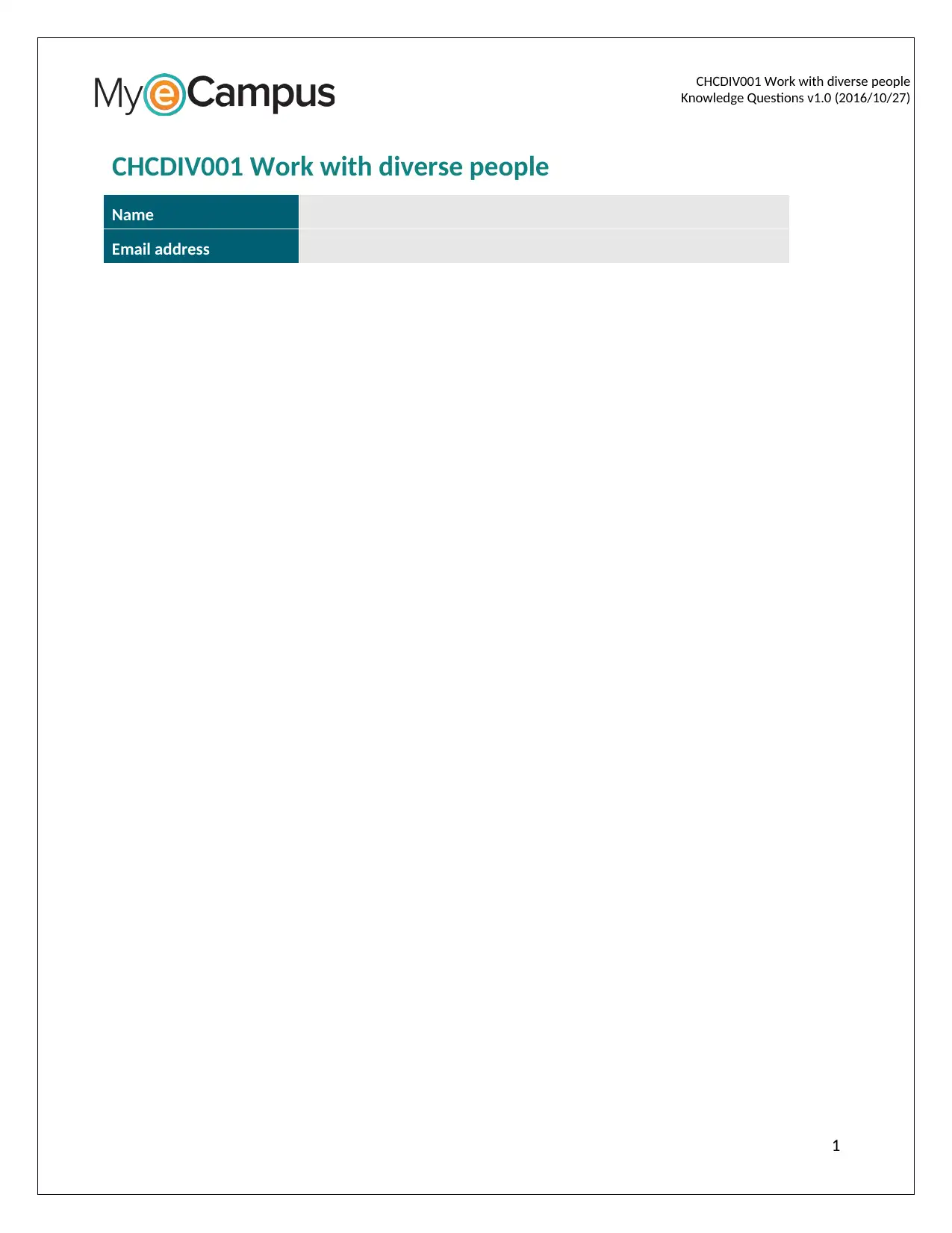
CHCDIV001 Work with diverse people
Knowledge Questions v1.0 (2016/10/27)
CHCDIV001 Work with diverse people
Name
Email address
1
Knowledge Questions v1.0 (2016/10/27)
CHCDIV001 Work with diverse people
Name
Email address
1
Paraphrase This Document
Need a fresh take? Get an instant paraphrase of this document with our AI Paraphraser
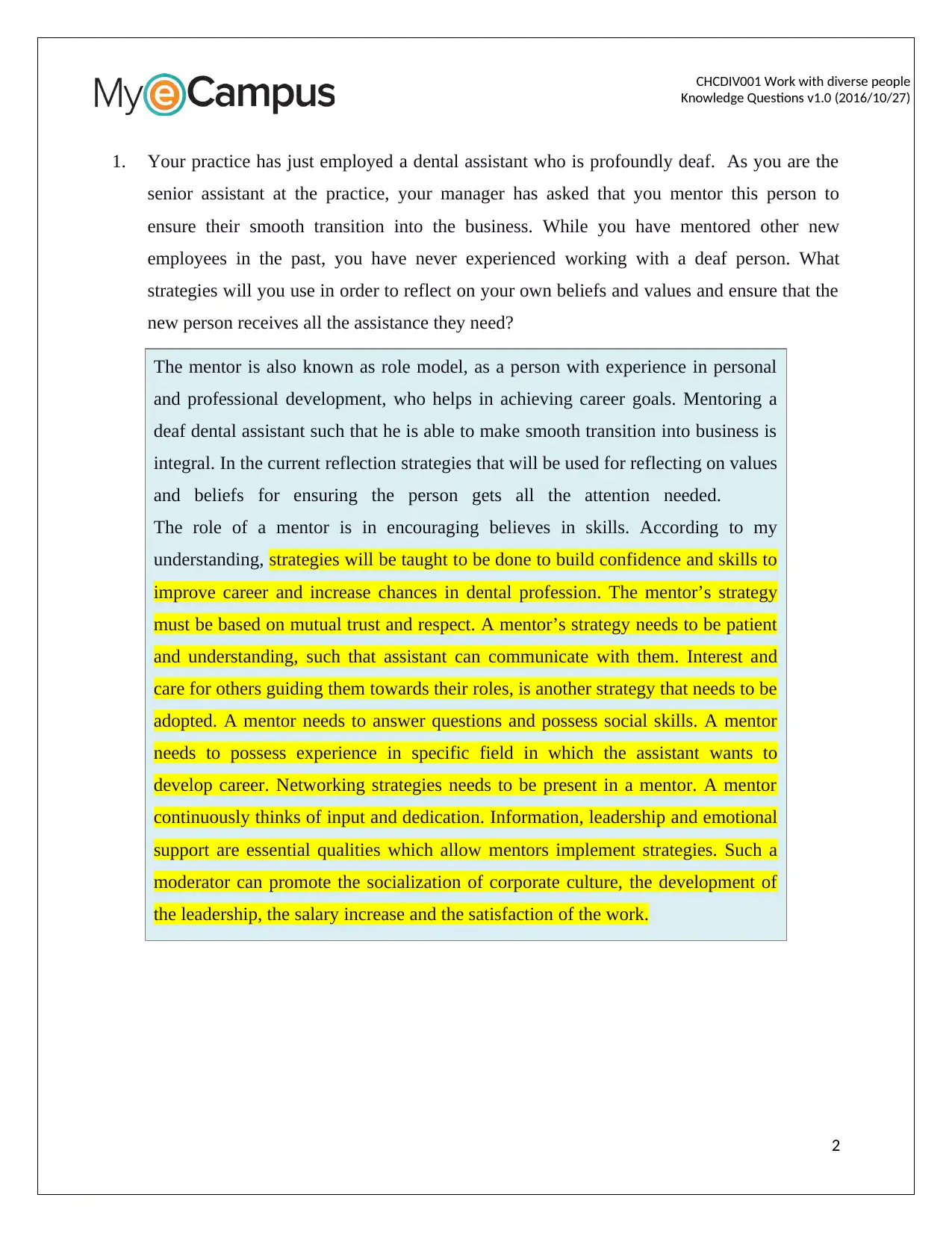
CHCDIV001 Work with diverse people
Knowledge Questions v1.0 (2016/10/27)
1. Your practice has just employed a dental assistant who is profoundly deaf. As you are the
senior assistant at the practice, your manager has asked that you mentor this person to
ensure their smooth transition into the business. While you have mentored other new
employees in the past, you have never experienced working with a deaf person. What
strategies will you use in order to reflect on your own beliefs and values and ensure that the
new person receives all the assistance they need?
The mentor is also known as role model, as a person with experience in personal
and professional development, who helps in achieving career goals. Mentoring a
deaf dental assistant such that he is able to make smooth transition into business is
integral. In the current reflection strategies that will be used for reflecting on values
and beliefs for ensuring the person gets all the attention needed.
The role of a mentor is in encouraging believes in skills. According to my
understanding, strategies will be taught to be done to build confidence and skills to
improve career and increase chances in dental profession. The mentor’s strategy
must be based on mutual trust and respect. A mentor’s strategy needs to be patient
and understanding, such that assistant can communicate with them. Interest and
care for others guiding them towards their roles, is another strategy that needs to be
adopted. A mentor needs to answer questions and possess social skills. A mentor
needs to possess experience in specific field in which the assistant wants to
develop career. Networking strategies needs to be present in a mentor. A mentor
continuously thinks of input and dedication. Information, leadership and emotional
support are essential qualities which allow mentors implement strategies. Such a
moderator can promote the socialization of corporate culture, the development of
the leadership, the salary increase and the satisfaction of the work.
2
Knowledge Questions v1.0 (2016/10/27)
1. Your practice has just employed a dental assistant who is profoundly deaf. As you are the
senior assistant at the practice, your manager has asked that you mentor this person to
ensure their smooth transition into the business. While you have mentored other new
employees in the past, you have never experienced working with a deaf person. What
strategies will you use in order to reflect on your own beliefs and values and ensure that the
new person receives all the assistance they need?
The mentor is also known as role model, as a person with experience in personal
and professional development, who helps in achieving career goals. Mentoring a
deaf dental assistant such that he is able to make smooth transition into business is
integral. In the current reflection strategies that will be used for reflecting on values
and beliefs for ensuring the person gets all the attention needed.
The role of a mentor is in encouraging believes in skills. According to my
understanding, strategies will be taught to be done to build confidence and skills to
improve career and increase chances in dental profession. The mentor’s strategy
must be based on mutual trust and respect. A mentor’s strategy needs to be patient
and understanding, such that assistant can communicate with them. Interest and
care for others guiding them towards their roles, is another strategy that needs to be
adopted. A mentor needs to answer questions and possess social skills. A mentor
needs to possess experience in specific field in which the assistant wants to
develop career. Networking strategies needs to be present in a mentor. A mentor
continuously thinks of input and dedication. Information, leadership and emotional
support are essential qualities which allow mentors implement strategies. Such a
moderator can promote the socialization of corporate culture, the development of
the leadership, the salary increase and the satisfaction of the work.
2
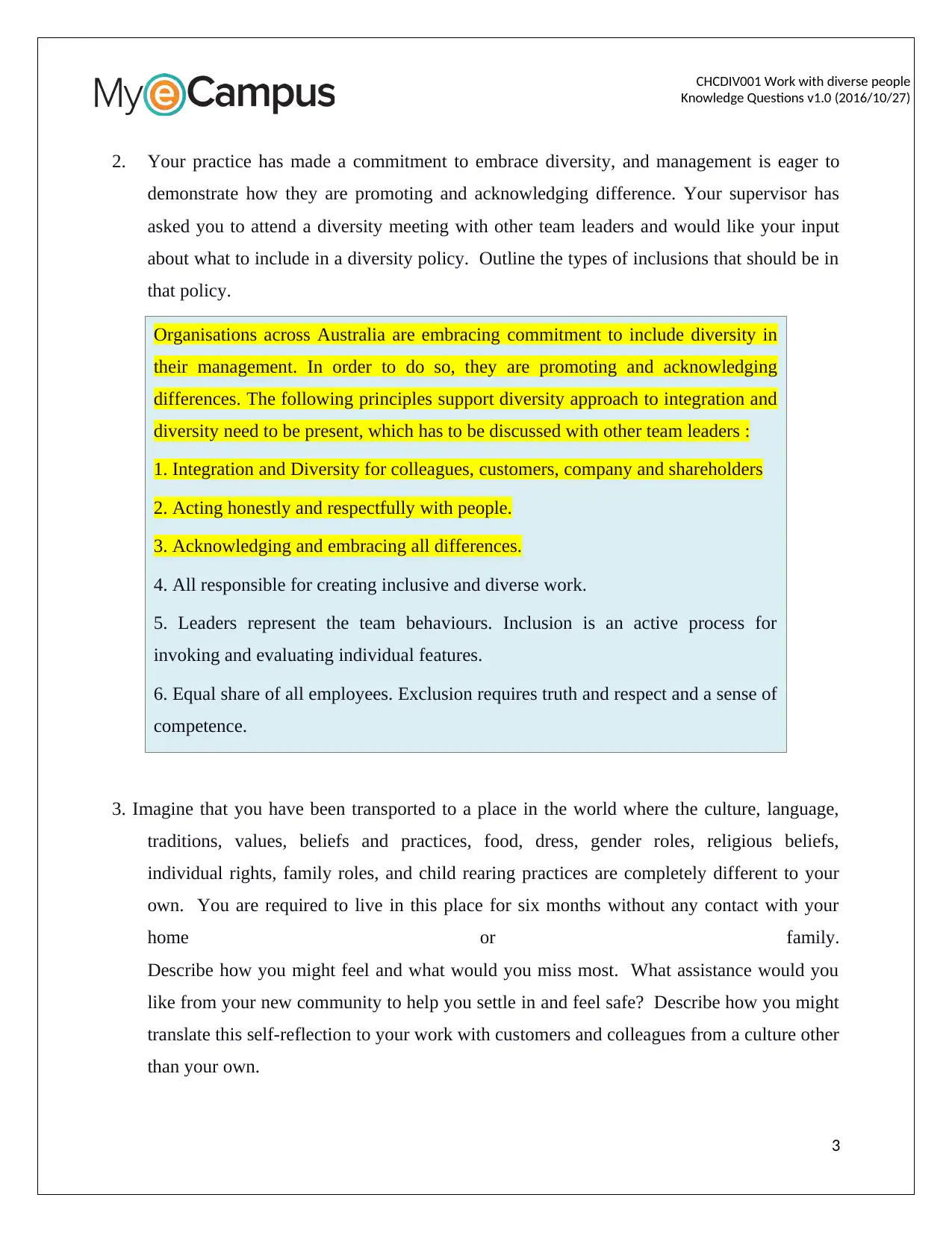
CHCDIV001 Work with diverse people
Knowledge Questions v1.0 (2016/10/27)
2. Your practice has made a commitment to embrace diversity, and management is eager to
demonstrate how they are promoting and acknowledging difference. Your supervisor has
asked you to attend a diversity meeting with other team leaders and would like your input
about what to include in a diversity policy. Outline the types of inclusions that should be in
that policy.
Organisations across Australia are embracing commitment to include diversity in
their management. In order to do so, they are promoting and acknowledging
differences. The following principles support diversity approach to integration and
diversity need to be present, which has to be discussed with other team leaders :
1. Integration and Diversity for colleagues, customers, company and shareholders
2. Acting honestly and respectfully with people.
3. Acknowledging and embracing all differences.
4. All responsible for creating inclusive and diverse work.
5. Leaders represent the team behaviours. Inclusion is an active process for
invoking and evaluating individual features.
6. Equal share of all employees. Exclusion requires truth and respect and a sense of
competence.
3. Imagine that you have been transported to a place in the world where the culture, language,
traditions, values, beliefs and practices, food, dress, gender roles, religious beliefs,
individual rights, family roles, and child rearing practices are completely different to your
own. You are required to live in this place for six months without any contact with your
home or family.
Describe how you might feel and what would you miss most. What assistance would you
like from your new community to help you settle in and feel safe? Describe how you might
translate this self-reflection to your work with customers and colleagues from a culture other
than your own.
3
Knowledge Questions v1.0 (2016/10/27)
2. Your practice has made a commitment to embrace diversity, and management is eager to
demonstrate how they are promoting and acknowledging difference. Your supervisor has
asked you to attend a diversity meeting with other team leaders and would like your input
about what to include in a diversity policy. Outline the types of inclusions that should be in
that policy.
Organisations across Australia are embracing commitment to include diversity in
their management. In order to do so, they are promoting and acknowledging
differences. The following principles support diversity approach to integration and
diversity need to be present, which has to be discussed with other team leaders :
1. Integration and Diversity for colleagues, customers, company and shareholders
2. Acting honestly and respectfully with people.
3. Acknowledging and embracing all differences.
4. All responsible for creating inclusive and diverse work.
5. Leaders represent the team behaviours. Inclusion is an active process for
invoking and evaluating individual features.
6. Equal share of all employees. Exclusion requires truth and respect and a sense of
competence.
3. Imagine that you have been transported to a place in the world where the culture, language,
traditions, values, beliefs and practices, food, dress, gender roles, religious beliefs,
individual rights, family roles, and child rearing practices are completely different to your
own. You are required to live in this place for six months without any contact with your
home or family.
Describe how you might feel and what would you miss most. What assistance would you
like from your new community to help you settle in and feel safe? Describe how you might
translate this self-reflection to your work with customers and colleagues from a culture other
than your own.
3
⊘ This is a preview!⊘
Do you want full access?
Subscribe today to unlock all pages.

Trusted by 1+ million students worldwide
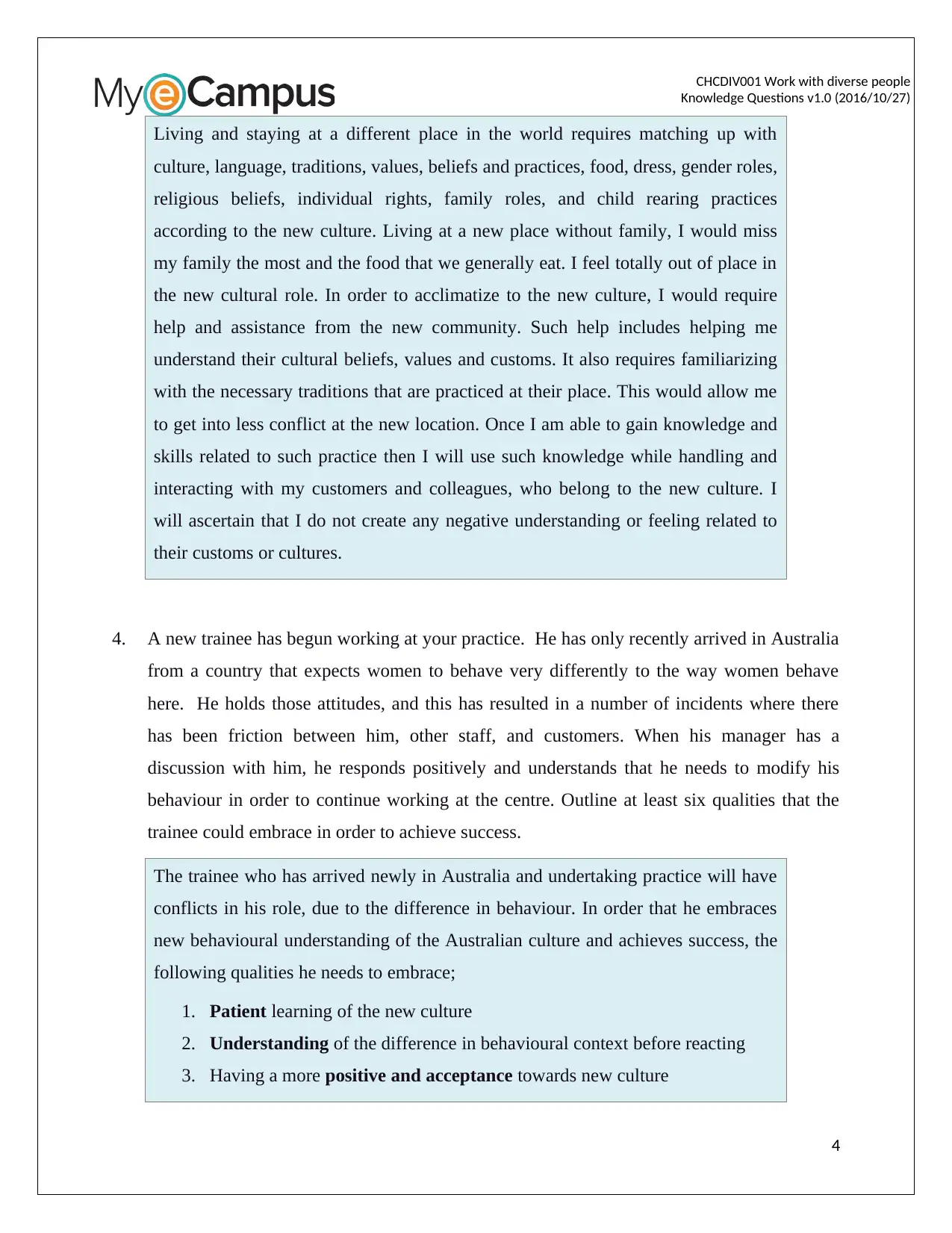
CHCDIV001 Work with diverse people
Knowledge Questions v1.0 (2016/10/27)
Living and staying at a different place in the world requires matching up with
culture, language, traditions, values, beliefs and practices, food, dress, gender roles,
religious beliefs, individual rights, family roles, and child rearing practices
according to the new culture. Living at a new place without family, I would miss
my family the most and the food that we generally eat. I feel totally out of place in
the new cultural role. In order to acclimatize to the new culture, I would require
help and assistance from the new community. Such help includes helping me
understand their cultural beliefs, values and customs. It also requires familiarizing
with the necessary traditions that are practiced at their place. This would allow me
to get into less conflict at the new location. Once I am able to gain knowledge and
skills related to such practice then I will use such knowledge while handling and
interacting with my customers and colleagues, who belong to the new culture. I
will ascertain that I do not create any negative understanding or feeling related to
their customs or cultures.
4. A new trainee has begun working at your practice. He has only recently arrived in Australia
from a country that expects women to behave very differently to the way women behave
here. He holds those attitudes, and this has resulted in a number of incidents where there
has been friction between him, other staff, and customers. When his manager has a
discussion with him, he responds positively and understands that he needs to modify his
behaviour in order to continue working at the centre. Outline at least six qualities that the
trainee could embrace in order to achieve success.
The trainee who has arrived newly in Australia and undertaking practice will have
conflicts in his role, due to the difference in behaviour. In order that he embraces
new behavioural understanding of the Australian culture and achieves success, the
following qualities he needs to embrace;
1. Patient learning of the new culture
2. Understanding of the difference in behavioural context before reacting
3. Having a more positive and acceptance towards new culture
4
Knowledge Questions v1.0 (2016/10/27)
Living and staying at a different place in the world requires matching up with
culture, language, traditions, values, beliefs and practices, food, dress, gender roles,
religious beliefs, individual rights, family roles, and child rearing practices
according to the new culture. Living at a new place without family, I would miss
my family the most and the food that we generally eat. I feel totally out of place in
the new cultural role. In order to acclimatize to the new culture, I would require
help and assistance from the new community. Such help includes helping me
understand their cultural beliefs, values and customs. It also requires familiarizing
with the necessary traditions that are practiced at their place. This would allow me
to get into less conflict at the new location. Once I am able to gain knowledge and
skills related to such practice then I will use such knowledge while handling and
interacting with my customers and colleagues, who belong to the new culture. I
will ascertain that I do not create any negative understanding or feeling related to
their customs or cultures.
4. A new trainee has begun working at your practice. He has only recently arrived in Australia
from a country that expects women to behave very differently to the way women behave
here. He holds those attitudes, and this has resulted in a number of incidents where there
has been friction between him, other staff, and customers. When his manager has a
discussion with him, he responds positively and understands that he needs to modify his
behaviour in order to continue working at the centre. Outline at least six qualities that the
trainee could embrace in order to achieve success.
The trainee who has arrived newly in Australia and undertaking practice will have
conflicts in his role, due to the difference in behaviour. In order that he embraces
new behavioural understanding of the Australian culture and achieves success, the
following qualities he needs to embrace;
1. Patient learning of the new culture
2. Understanding of the difference in behavioural context before reacting
3. Having a more positive and acceptance towards new culture
4
Paraphrase This Document
Need a fresh take? Get an instant paraphrase of this document with our AI Paraphraser
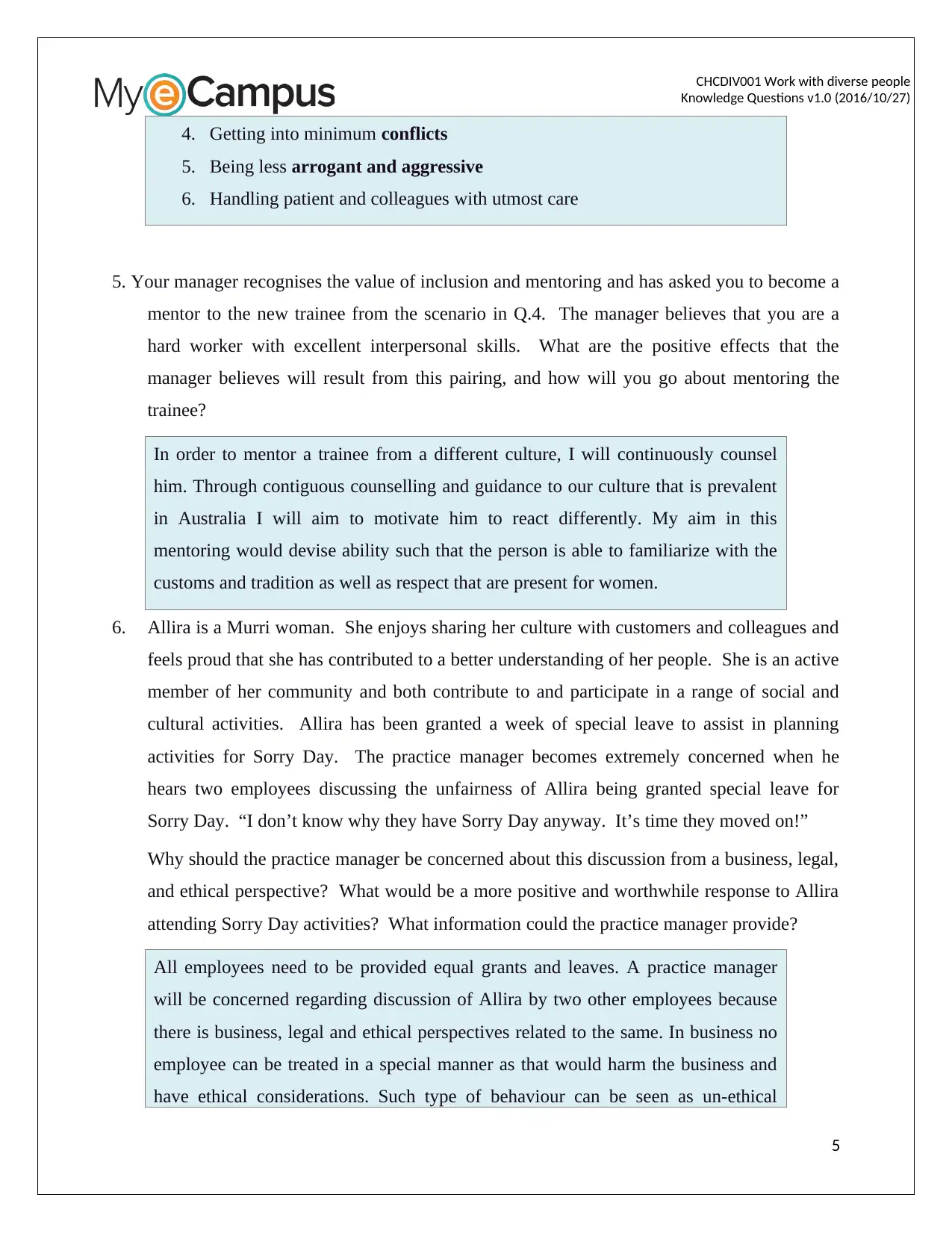
CHCDIV001 Work with diverse people
Knowledge Questions v1.0 (2016/10/27)
4. Getting into minimum conflicts
5. Being less arrogant and aggressive
6. Handling patient and colleagues with utmost care
5. Your manager recognises the value of inclusion and mentoring and has asked you to become a
mentor to the new trainee from the scenario in Q.4. The manager believes that you are a
hard worker with excellent interpersonal skills. What are the positive effects that the
manager believes will result from this pairing, and how will you go about mentoring the
trainee?
In order to mentor a trainee from a different culture, I will continuously counsel
him. Through contiguous counselling and guidance to our culture that is prevalent
in Australia I will aim to motivate him to react differently. My aim in this
mentoring would devise ability such that the person is able to familiarize with the
customs and tradition as well as respect that are present for women.
6. Allira is a Murri woman. She enjoys sharing her culture with customers and colleagues and
feels proud that she has contributed to a better understanding of her people. She is an active
member of her community and both contribute to and participate in a range of social and
cultural activities. Allira has been granted a week of special leave to assist in planning
activities for Sorry Day. The practice manager becomes extremely concerned when he
hears two employees discussing the unfairness of Allira being granted special leave for
Sorry Day. “I don’t know why they have Sorry Day anyway. It’s time they moved on!”
Why should the practice manager be concerned about this discussion from a business, legal,
and ethical perspective? What would be a more positive and worthwhile response to Allira
attending Sorry Day activities? What information could the practice manager provide?
All employees need to be provided equal grants and leaves. A practice manager
will be concerned regarding discussion of Allira by two other employees because
there is business, legal and ethical perspectives related to the same. In business no
employee can be treated in a special manner as that would harm the business and
have ethical considerations. Such type of behaviour can be seen as un-ethical
5
Knowledge Questions v1.0 (2016/10/27)
4. Getting into minimum conflicts
5. Being less arrogant and aggressive
6. Handling patient and colleagues with utmost care
5. Your manager recognises the value of inclusion and mentoring and has asked you to become a
mentor to the new trainee from the scenario in Q.4. The manager believes that you are a
hard worker with excellent interpersonal skills. What are the positive effects that the
manager believes will result from this pairing, and how will you go about mentoring the
trainee?
In order to mentor a trainee from a different culture, I will continuously counsel
him. Through contiguous counselling and guidance to our culture that is prevalent
in Australia I will aim to motivate him to react differently. My aim in this
mentoring would devise ability such that the person is able to familiarize with the
customs and tradition as well as respect that are present for women.
6. Allira is a Murri woman. She enjoys sharing her culture with customers and colleagues and
feels proud that she has contributed to a better understanding of her people. She is an active
member of her community and both contribute to and participate in a range of social and
cultural activities. Allira has been granted a week of special leave to assist in planning
activities for Sorry Day. The practice manager becomes extremely concerned when he
hears two employees discussing the unfairness of Allira being granted special leave for
Sorry Day. “I don’t know why they have Sorry Day anyway. It’s time they moved on!”
Why should the practice manager be concerned about this discussion from a business, legal,
and ethical perspective? What would be a more positive and worthwhile response to Allira
attending Sorry Day activities? What information could the practice manager provide?
All employees need to be provided equal grants and leaves. A practice manager
will be concerned regarding discussion of Allira by two other employees because
there is business, legal and ethical perspectives related to the same. In business no
employee can be treated in a special manner as that would harm the business and
have ethical considerations. Such type of behaviour can be seen as un-ethical
5
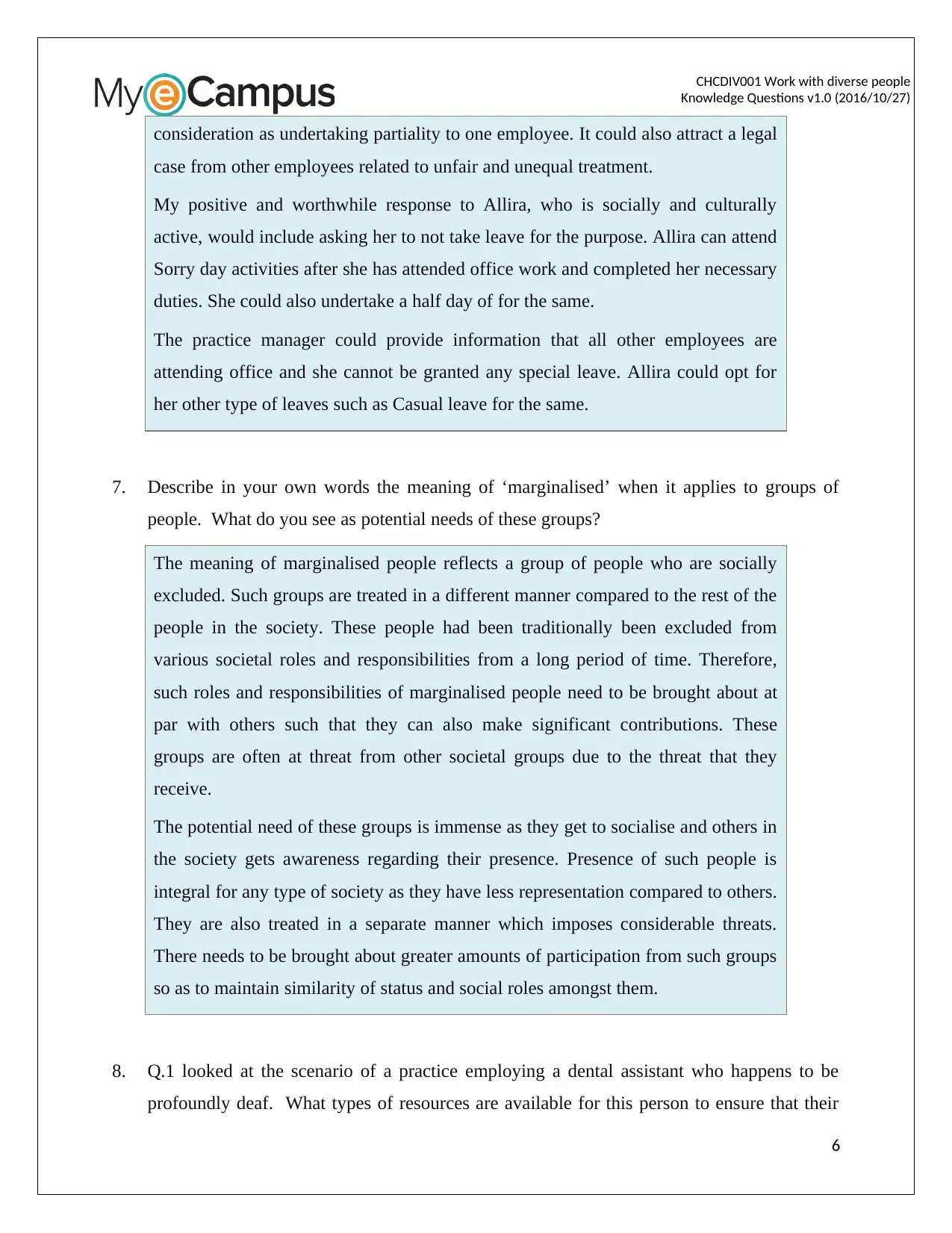
CHCDIV001 Work with diverse people
Knowledge Questions v1.0 (2016/10/27)
consideration as undertaking partiality to one employee. It could also attract a legal
case from other employees related to unfair and unequal treatment.
My positive and worthwhile response to Allira, who is socially and culturally
active, would include asking her to not take leave for the purpose. Allira can attend
Sorry day activities after she has attended office work and completed her necessary
duties. She could also undertake a half day of for the same.
The practice manager could provide information that all other employees are
attending office and she cannot be granted any special leave. Allira could opt for
her other type of leaves such as Casual leave for the same.
7. Describe in your own words the meaning of ‘marginalised’ when it applies to groups of
people. What do you see as potential needs of these groups?
The meaning of marginalised people reflects a group of people who are socially
excluded. Such groups are treated in a different manner compared to the rest of the
people in the society. These people had been traditionally been excluded from
various societal roles and responsibilities from a long period of time. Therefore,
such roles and responsibilities of marginalised people need to be brought about at
par with others such that they can also make significant contributions. These
groups are often at threat from other societal groups due to the threat that they
receive.
The potential need of these groups is immense as they get to socialise and others in
the society gets awareness regarding their presence. Presence of such people is
integral for any type of society as they have less representation compared to others.
They are also treated in a separate manner which imposes considerable threats.
There needs to be brought about greater amounts of participation from such groups
so as to maintain similarity of status and social roles amongst them.
8. Q.1 looked at the scenario of a practice employing a dental assistant who happens to be
profoundly deaf. What types of resources are available for this person to ensure that their
6
Knowledge Questions v1.0 (2016/10/27)
consideration as undertaking partiality to one employee. It could also attract a legal
case from other employees related to unfair and unequal treatment.
My positive and worthwhile response to Allira, who is socially and culturally
active, would include asking her to not take leave for the purpose. Allira can attend
Sorry day activities after she has attended office work and completed her necessary
duties. She could also undertake a half day of for the same.
The practice manager could provide information that all other employees are
attending office and she cannot be granted any special leave. Allira could opt for
her other type of leaves such as Casual leave for the same.
7. Describe in your own words the meaning of ‘marginalised’ when it applies to groups of
people. What do you see as potential needs of these groups?
The meaning of marginalised people reflects a group of people who are socially
excluded. Such groups are treated in a different manner compared to the rest of the
people in the society. These people had been traditionally been excluded from
various societal roles and responsibilities from a long period of time. Therefore,
such roles and responsibilities of marginalised people need to be brought about at
par with others such that they can also make significant contributions. These
groups are often at threat from other societal groups due to the threat that they
receive.
The potential need of these groups is immense as they get to socialise and others in
the society gets awareness regarding their presence. Presence of such people is
integral for any type of society as they have less representation compared to others.
They are also treated in a separate manner which imposes considerable threats.
There needs to be brought about greater amounts of participation from such groups
so as to maintain similarity of status and social roles amongst them.
8. Q.1 looked at the scenario of a practice employing a dental assistant who happens to be
profoundly deaf. What types of resources are available for this person to ensure that their
6
⊘ This is a preview!⊘
Do you want full access?
Subscribe today to unlock all pages.

Trusted by 1+ million students worldwide
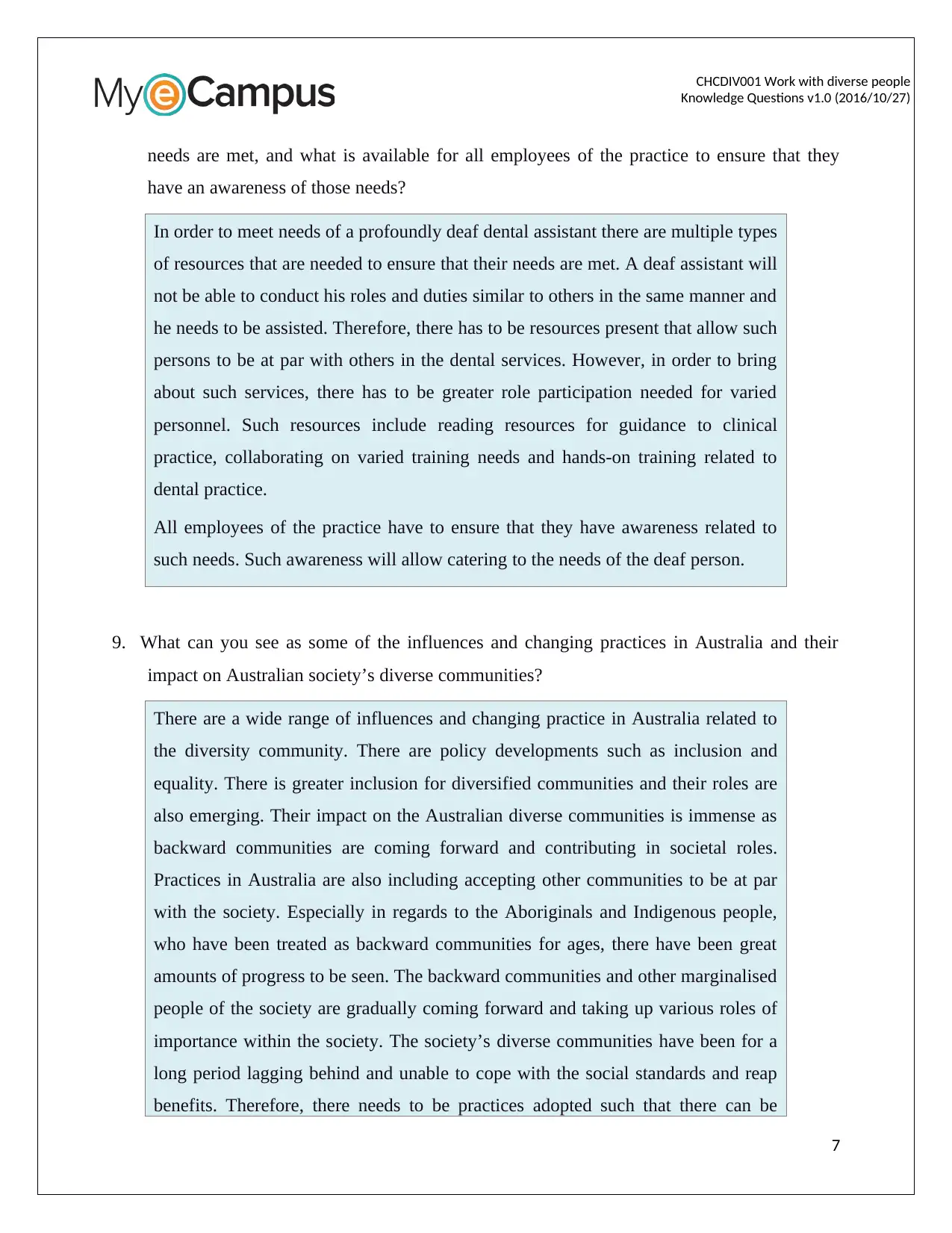
CHCDIV001 Work with diverse people
Knowledge Questions v1.0 (2016/10/27)
needs are met, and what is available for all employees of the practice to ensure that they
have an awareness of those needs?
In order to meet needs of a profoundly deaf dental assistant there are multiple types
of resources that are needed to ensure that their needs are met. A deaf assistant will
not be able to conduct his roles and duties similar to others in the same manner and
he needs to be assisted. Therefore, there has to be resources present that allow such
persons to be at par with others in the dental services. However, in order to bring
about such services, there has to be greater role participation needed for varied
personnel. Such resources include reading resources for guidance to clinical
practice, collaborating on varied training needs and hands-on training related to
dental practice.
All employees of the practice have to ensure that they have awareness related to
such needs. Such awareness will allow catering to the needs of the deaf person.
9. What can you see as some of the influences and changing practices in Australia and their
impact on Australian society’s diverse communities?
There are a wide range of influences and changing practice in Australia related to
the diversity community. There are policy developments such as inclusion and
equality. There is greater inclusion for diversified communities and their roles are
also emerging. Their impact on the Australian diverse communities is immense as
backward communities are coming forward and contributing in societal roles.
Practices in Australia are also including accepting other communities to be at par
with the society. Especially in regards to the Aboriginals and Indigenous people,
who have been treated as backward communities for ages, there have been great
amounts of progress to be seen. The backward communities and other marginalised
people of the society are gradually coming forward and taking up various roles of
importance within the society. The society’s diverse communities have been for a
long period lagging behind and unable to cope with the social standards and reap
benefits. Therefore, there needs to be practices adopted such that there can be
7
Knowledge Questions v1.0 (2016/10/27)
needs are met, and what is available for all employees of the practice to ensure that they
have an awareness of those needs?
In order to meet needs of a profoundly deaf dental assistant there are multiple types
of resources that are needed to ensure that their needs are met. A deaf assistant will
not be able to conduct his roles and duties similar to others in the same manner and
he needs to be assisted. Therefore, there has to be resources present that allow such
persons to be at par with others in the dental services. However, in order to bring
about such services, there has to be greater role participation needed for varied
personnel. Such resources include reading resources for guidance to clinical
practice, collaborating on varied training needs and hands-on training related to
dental practice.
All employees of the practice have to ensure that they have awareness related to
such needs. Such awareness will allow catering to the needs of the deaf person.
9. What can you see as some of the influences and changing practices in Australia and their
impact on Australian society’s diverse communities?
There are a wide range of influences and changing practice in Australia related to
the diversity community. There are policy developments such as inclusion and
equality. There is greater inclusion for diversified communities and their roles are
also emerging. Their impact on the Australian diverse communities is immense as
backward communities are coming forward and contributing in societal roles.
Practices in Australia are also including accepting other communities to be at par
with the society. Especially in regards to the Aboriginals and Indigenous people,
who have been treated as backward communities for ages, there have been great
amounts of progress to be seen. The backward communities and other marginalised
people of the society are gradually coming forward and taking up various roles of
importance within the society. The society’s diverse communities have been for a
long period lagging behind and unable to cope with the social standards and reap
benefits. Therefore, there needs to be practices adopted such that there can be
7
Paraphrase This Document
Need a fresh take? Get an instant paraphrase of this document with our AI Paraphraser
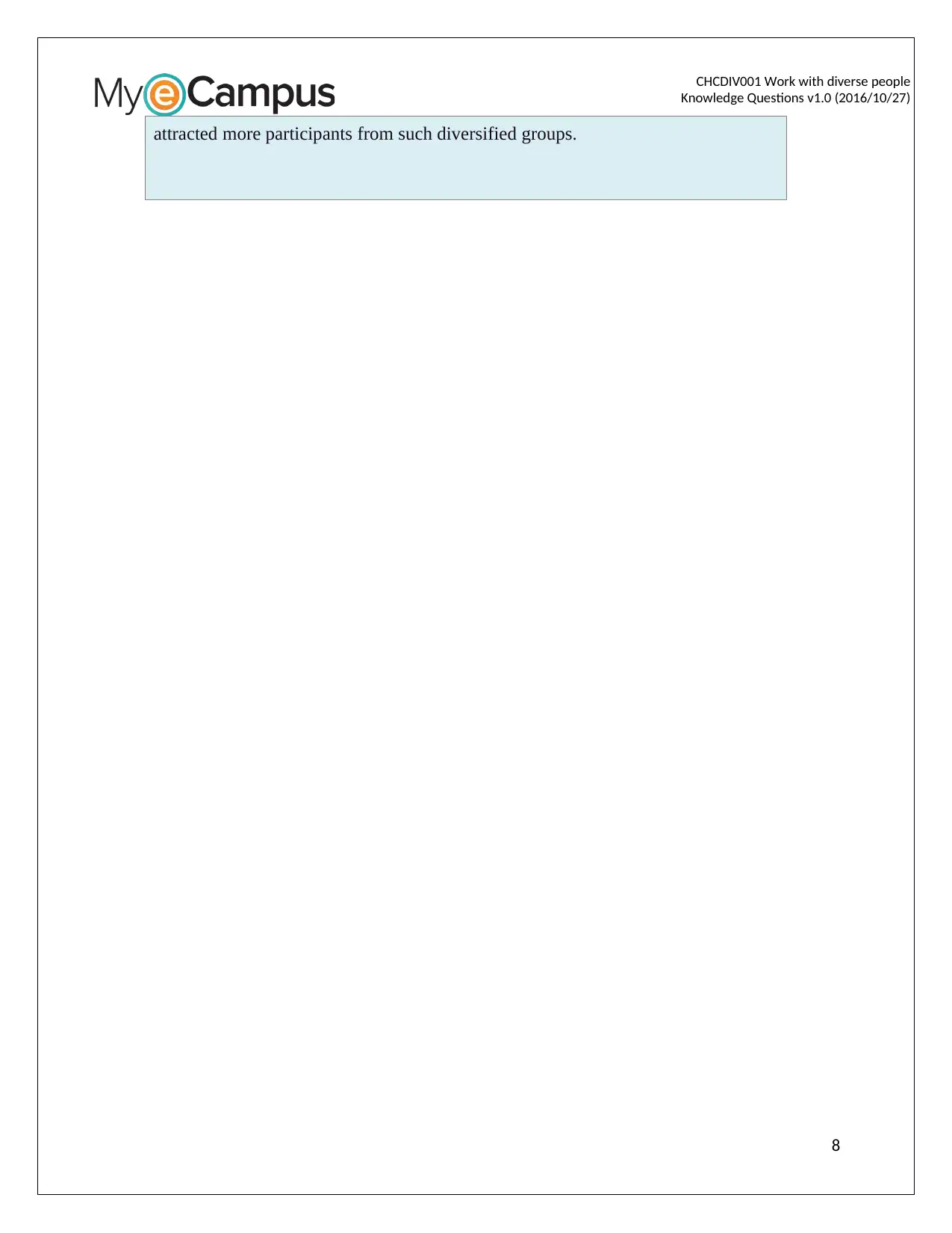
CHCDIV001 Work with diverse people
Knowledge Questions v1.0 (2016/10/27)
attracted more participants from such diversified groups.
8
Knowledge Questions v1.0 (2016/10/27)
attracted more participants from such diversified groups.
8
1 out of 8
Related Documents
Your All-in-One AI-Powered Toolkit for Academic Success.
+13062052269
info@desklib.com
Available 24*7 on WhatsApp / Email
![[object Object]](/_next/static/media/star-bottom.7253800d.svg)
Unlock your academic potential
Copyright © 2020–2026 A2Z Services. All Rights Reserved. Developed and managed by ZUCOL.


